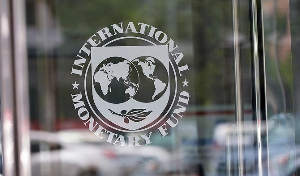The International Monetary Fund (IMF) has reiterated the need for policymakers to remain vigilant and direct economic strategies in response to emerging global risks.
While some economies are expected to rebound, the IMF’s latest World Economic Report highlights that the global economic outlook remains fragile despite promising signs of recovery. Key risks, such as regional conflicts, climate shocks and migration slowdowns, require urgent action.
Pierre-Olivier Gourinchas, Economic Counsellor and Director of Research at the IMF, outlined a policy “triple pivot” that aims to safeguard global growth and mitigate downside risks.
He emphasised that “policymakers need to shift gears” in a coordinated approach to address evolving challenges.
Ghana’s growth outlook and global context
Ghana’s recent economic performance stands in stark contrast to global uncertainties. The country recorded a remarkable real GDP growth rate of 5.8 percent in the first half of 2024, its highest in five years.
This growth is nearly double the 2.9 percent growth recorded during the same period in 2023 and significantly surpasses the 2024 revised annual growth target of 3.1 percent.
Analysts attribute this surge to a combination of factors, including steady expansion in key sectors during the first and second quarters which saw growth rates of 4.8 percent and 6.9 percent respectively. The strong economic performance has fuelled optimism, but external risks such as the global economic slowdown and rising inflation pressures in other regions could still have an impact.
Mr. Gourinchas pointed out that while disinflation has been a “major achievement”, risks remain tilted toward the downside. Factors like escalating conflicts in the Middle East and unfavourable trade policies could further undermine growth.
“The decline in inflation without triggering a global recession has been a significant success,” he said. “But new risks are emerging that require decisive action.”
Triple policy pivot
To mitigate these risks, the IMF proposes three critical policy pivots – monetary, fiscal and growth financing reforms – that could strengthen the global economy.
The first pivot revolves around monetary policy. With inflation easing in several major economies, central banks are poised to shift toward monetary easing.
In September, the Bank of Ghana reduced its Monetary Policy Rate by 200 basis points to 27 percent, citing improvements in the country’s macroeconomic conditions. However, the Bank has now revised its year-end inflation target to 18 percent – citing upside risks including some geopolitical developments.
The central bank’s revision comes after earlier optimism expressed after its September 2023 Monetary Policy Committee (MPC) meeting, where six months of consistent disinflation promoted a two percent rate cut.
Notwithstanding, a surprise uptick – which saw inflation reach 21.5 percent in September 2024, up from 20.4 percent in August – prompted suggestions that the apex bank might have been hasty in its decision.
According to the Director: “The decline in inflation has opened the door for central banks to begin easing policies, which could relieve some of the pressure on emerging markets”.
However, he cautioned that vigilance is necessary, particularly, in sectors like services, where inflation remains persistent.
The second pivot focuses on fiscal policy, noting the need for governments to stabilise debt levels and rebuild fiscal buffers.
In this context, Ghana’s performance has been a bright spot. Despite global challenges, the country’s fiscal measures and debt management strategies amid an IMF programme have been largely effective.
However, the IMF urges continued caution; recommending that Ghana and similar economies remain committed to multi-year fiscal adjustments to avoid destabilising shocks.
The third pivot focuses on growth-financing reforms.
Mr. Gourinchas stated that while some nations have implemented industrial and trade policies aimed at protecting local industries, these measures are often short-lived and fail to deliver sustained improvements in standards of living. Instead, the IMF encourages ambitious domestic reforms that boost innovation, human capital and competition.
“Growth must come from reforms that foster innovation and improve resource allocation,” he noted.
Business News of Wednesday, 23 October 2024
Source: thebftonline.com

















